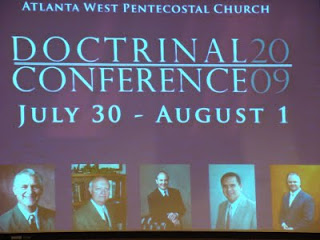Atlanta West Pentecostal Church--Doctrinal Conference--General Session 1--David Bernard
 Several weeks ago at our Alabama District Family Camp, Pastor Darrell Johns of Atlanta West Pentecostal Church, mentioned to me a doctrinal conference that would be hosted at church he pastors the last weekend in June. Immediately when he invited, I felt like it would be beneficial for me. My only regret is that more of our Dothan folks could not make it. As it stands Brother Patterson along with Charlie and Patty Joyner made the trek with me.
Several weeks ago at our Alabama District Family Camp, Pastor Darrell Johns of Atlanta West Pentecostal Church, mentioned to me a doctrinal conference that would be hosted at church he pastors the last weekend in June. Immediately when he invited, I felt like it would be beneficial for me. My only regret is that more of our Dothan folks could not make it. As it stands Brother Patterson along with Charlie and Patty Joyner made the trek with me. On arrival we received a 1st class notebook of some 30 pages or so of very good notes that are going to be very useful in the future. The notes alone are worth the price of registration. From reading Brother Johns’ welcome in the notebook, this whole endeavor was apparently created by Jonathon and Missy Copeland who attend AWPC. Again, my hat is off to them for such an outstanding effort that is going to serve many very well.
After a brief time of good-spirited music, Brother Johns introduced Pastor David Bernard of New Life United Pentecostal Church. Brother Johns mentioned how their friendship went back to the early ‘80’s when he was on staff at the United Pentecostal Church in Jackson, Mississippi and Brother Bernard was on staff at Jackson College of Ministries. During that time, Brother Bernard wrote his first book on personal holiness which was the beginning of a very prolific writing career that now boasts of some 30 books or so, along with many articles and booklets. Brother Johns also mentioned how extremely disciplined that Brother Bernard was with his time. More and more I am coming to think that talent is not so much the key as is just raw discipline and a matching work ethic.
 Brother Bernard opened up the General Session I by taking his text from Acts 2:42:
Brother Bernard opened up the General Session I by taking his text from Acts 2:42:Acts 2:42 KJV And they continued stedfastly in the apostles' doctrine and fellowship, and in breaking of bread, and in prayers.
His assignment was “The Apostolic Faith.” What follows are my scribblings during this session:
-Doctrine is of crucial importance in our times. Doctrine can only come from the Word of God. This is where our authority comes from. The Word has to be our only authority.
-We cannot err from the Scriptures, they are timeless and without error. Creeds, councils, etc. hold no equivalent to the Scriptures.
-I have a personal responsibility to fulfill what the Bible commands. It cannot be a matter of preference but it solely rests on a matter of obedience.
-Apostolic (defined)—Like the apostles. Following their practices, teachings, and methods.
-The Gospels tells us who Jesus is. Acts gives the birth of the Church in a story form but it is more than just history. It serves as the game plan or blue print of an Apostolic church whether 1st century or 21st century.
-The Epistles are doctrinal in content yet practical for living for God.
-If you accept the Bible then one will have to take the Apostle’s doctrine as the supreme example.
-Jude 3 mandates that we contend earnestly for the faith once delivered to the saints. Faith is not a maturing thing. Faith defined for the 1st century will have the same definition for the our times. The “faith” is a once for all men. The creeds from the 4th century and the councils from the 7th century does not clarify or perfect what the Bible specifically states.
-What is the “faith”? The “faith” is what the Apostles taught. They followed through with Matthew 28:19-20 and made converts.
-No man has the right to create his own personal theology. From church history it is clear that Luther stood and fought against 1000 years of tradition and declared that our faith must come from Scripture alone (sola Scriptura).
-Throughout church history we find that there were those who spoke with tongues. However it was not until the early 1900’s that Pentecostalism arose as a whole. Charles Parham in Topeka, Kansas challenged his students to find out what the initial sign of being Spirit-filled was. When they returned, from the Scriptures their answer was that they spoke with tongues when they initially received the Spirit.
-The Pentecostal movement did not start with emotionalism, creeds, etc. it started with a look at the Scriptures.
-William Seymour, who had some association with Parham, continued this trend on Azusa Street in Los Angeles, California and experienced a vibrant revival also.
-One of the precedents that one finds in the Scriptures is the Apostles baptizing by immersion in the Name of Jesus (Acts 2, 8, 10, 19, & 22).
-Made reference to History of Christian Doctrine—Volume 2 where that it is documented that Luther actually defended those who baptized in this manner. (I got lost in this section trying to take notes and now my notes are so scrambled, I don’t know what Brother Bernard said nor what I wrote, but suffice it to say, he said something and I wrote something. We will cipher it out when I get the CDs!!!) Ulrich Zwingli, a contemporary of Luther, also knew of Jesus Name Baptism. John Calvin, the successor of Zwingli, fought it (he also fought and had Michael Servetus killed.) Karl Barth comes along and declares that in the interest of the ecumenical spirit that we should ignore this model of baptism and stay with tradition.
-What we do is always a matter of obedience. . . !!!!
-Brother Bernard concluded with a summation of “The Five Elements of The Apostolic Church.”
1. The Apostolic Experience—Acts 2:1-4—The Wind. It blows where it listeth. . . Jesus stated this to Nicodemus. The Cloven Tongues of Fire—It touched each of them. This is symbolic that this Holy Spirit experience was for each individual and not corporately for the Apostolic Church. Filled—They spoke with tongues. This was not gibberish because the multitude recognized languages. This continues today (Acts 10:46; 2:16; 2:33; 2:38; Titus 2:11).
2. The Apostolic Message—Acts 2:16—Peter is reaching back to Joel 2:28 and affirming this is a work of God.
3. Apostolic Fellowship/Unity—Acts 2:42, 44-45—Fellowship and unity promoted giving so that they were able to get involved in evangelism.
4. Apostolic Prayer/Praise—Acts 2:47—We are to love the Lord with everything (Deuteronomy 6:5). We are to have passion in our prayer and also in our praise.
5. Apostolic Miracles, Signs, and Wonders—Acts 2:43—Miracles can take place in this kind of setting. Go back to the apostles in all of these things and it will breathe life back into the Apostolic church.
I will try to continue to blog as time permits. . . . I have placed some pics on Flickr also. . .



Comments
Do you have any notes from Dr. Segraves sessions? Thanks
Robert Wright
rev.robertwright@gmail.com